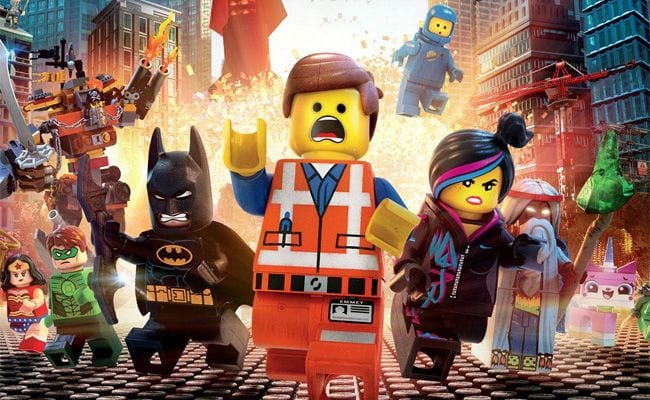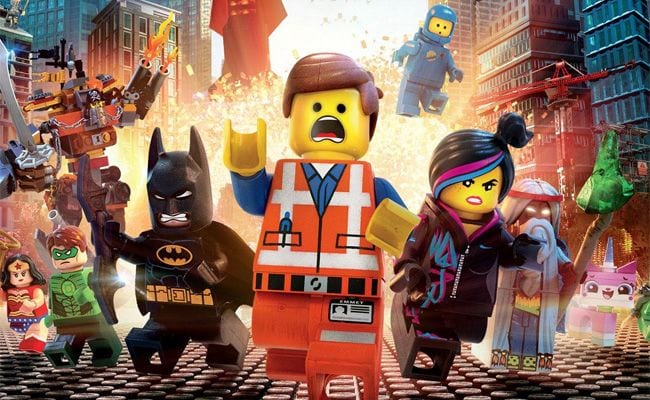
The subtext of Phil Lord and Christopher Miller’s cheeky, retro-subversive The Lego Movie isn’t buried too far beneath its plastic brick surface. But even though it’s a feature-length commercial for a world-conquering toy brand that makes sure to find room to plug a few other big-ticket media franchises (DC comics, Star Wars), it still offers genuine artistry. With as much in common with Battleship and the GI Joe movies as with The 400 Blows, this past weekend’s box-office winner might be mostly empty calories, but they’re tasty.
Like every kids’ movie today, The Lego Movie is about an ordinary schmo called to do extraordinary, non-schmo-like things. Emmet (voiced by Chris Pratt) is a standard-issue construction worker in a scary-bright Lego city that runs on choreographed, caffeinated conformity. Greeting the morning with a smile and a herky-jerk exercise routine, Emmet can’t wait to follow every routine that’s laid out for him. That includes following the ubiquitous instruction manuals (“If you see anything weird, report it immediately”) to rocking out to the up-tempo dance-anthem blasting from every radio in earshot: “Everything is Awesome.” There is no other song playing in his world and it stays with you afterward like the worst, most effective ad jingle ever crafted.
Of course, everything is not awesome. The beloved President Business (Will Ferrell) — spotted in an opening Middle Earth-ian battle scene as a dark lord given to hideous cackles and pronouncements of doom — is a successful tycoon fearful of anything unpredictable. That explains (sort of) the super-weapon he plans to unleash on Legoland, in hopes of preventing the changes sure to be wrought by a prophesied Chosen One. In a plot that seems inspired by the children’s story Philip K. Dick never wrote, Emmet is revealed as that Chosen One upon whose thin plastic shoulders falls the fate of the toy world.
If it were only this simple, The Lego Movie would be insufferable. The story is littered with familiar bits, from the rebellious rocker-girl Wyldstyle (Elizabeth Banks) who inspires Emmet to join an underground collective led by Vitruvius (Morgan Freeman, well beyond self-satire at this point). He’s engaged in an epic Gandalf-vs. Sauron-style battle: President Business is supported by legions of malevolent robots, the Stasi-like Bad Cop/Good Cop (Liam Neeson), and a group called the Micromanagers, while Vitruvius has a ragtag bunch of misfits drawn from every dusty, forgotten drawer of the Lego universe, including the cyborg pirate Metal Beard (Nick Offerman), the 2002 NBA All-Stars, the Millennium Falcon, Superman, and Batman (Will Arnett). This crew in particular constitutes one of the most effective ensembles ever assembled for an animated film, with a crackling comic interplay and resolute disregard for the rules of reality.
While Emmet’s realization that he’s special is about as predictable as President Business might like. But the film doesn’t dwell on such clichés, blasting right past this tenet of be-yourself positivity to deliver a more enduring message in favor of anarchic freedom. The forces of evil in The Lego Movie are not only by the usual corporate sorts who would back a President Business, using media to push a branded form of rebellion as just another product. Instead, the villains here tell people how to build things, according to a very specific, sometimes elaborate blueprint. Of course, Lego has been criticized in recent years for just such practice, selling sets so complex that children build them once and then never play with them again. As a late — and yes, predictable — development in the film makes clear, toys should be just instruments for play, for exploration and fun, not a pre-set end result.
The Lego Movie‘s aesthetic smartly buttresses this message. Unlike so many kids’ movies today, its animation style doesn’t draw attention to its dazzling newness, but instead evokes the action-figure stop-motion of Robot Chicken and thousands of amateur videos. The humor is also somewhat retro, occasionally surreal, as though some YouTube snark-snipers have been let loose in the company candy shop. How else to explain the team’s journey to the anime-trippy Cloud Cuckooland, presided over by the terrifyingly positive Unikitty (Alison Brie) or the movie’s repeated mocking of Batman’s pompous brooding?
The Lego Movie isn’t exactly calling for open rebellion against the corporate toy complex that provides its title: it means to sell interlocking plastic blocks. But in a world of cloud server-scheduled childhoods, proposing that kids should be left alone to play however they damn well feel like it seems at least mildly rebellious.

